by Mary E. Ulrich | Jul 12, 2024
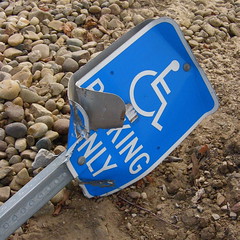
 photo credit: djwhelan
photo credit: djwhelan
Every day we read about good people planning charity events for people with disabilities.
I’m not sure how I feel about this.
Wait! Are you wondering how I can be an advocate for people with disabilities and not just jump up and down when two caring people are trying to raise funds for people with disabilities?
Let’s just say, “It’s complicated.”
My first fundraiser was when Tommy was an infant, Aaron was 20 months old and still not sleeping through the night. Two hours a day, I would drive them across town to Stepping Stones Center for the Handicapped. Perfect time for me to volunteer to lead the fundraiser, eh?
What pushed me into action was the 30 babies in the Stepping Stones program and no teacher. Sure there were amazing volunteers. But these children, who needed so much help, did not have a qualified teacher. I found that unacceptable. I could sleep in a couple of years.
Community Fundraisers
The local shopping center was having its annual charity craft show. At the organizational meeting, I gave my impassioned speech, we were chosen as the “designated charity” and then for the next month all the parents, grandparents, friends, and neighbors of the “Tiny Tots Program” spent our free time making items for our booth. We raised about $3,000 which was matched by the organization and an official “teacher” was hired.
Special Fundraisers
After that, there were fundraisers for The Mothers of Special Children and the Arc (formerly known as the Association for Retarded Children), and TASH (formerly known as The Association for People with Severe Handicaps), and the school district Special Parents group to fund summer school… and on and on.
I met other mothers (mostly) and we had many good times, but I started asking why we had to have charity drives to fund important services other children in the community took for granted.
Regular Inclusive Fundraisers
After our court case and Aaron was finally allowed to go to public school, I got involved in the regular school PTO fundraisers. We had spaghetti dinners, White Elephant sales, Dances, Raffles, Magic Shows, Motorcycle Rides, Bake Sales, Races for… and saving boxtops, and cans… It goes on and on.
I learned about inclusion (click here) and realized we didn’t need a “special track team” we only needed an extra support person to help Aaron to participate in the track team events.
“Disability World” Fundraisers
This led to more committees, grant writing, and working for levies for the County Board of Mental Retardation and Developmental Disabilities as well as the regular local school district.
Other parents got to have jobs and earn money to help their families. I got to be the only non-paid person at numerous committee meetings.
Now, we did some great things that wouldn’t have happened without the volunteer parents. We began an after-school club and a summer school program so our children would have something to do and not lose all the skills they gained during the school year. We started four non-profit groups and incorporated them. Yes, indeedy, sleep would have to wait.
But it never ends.
I believe many of the “professionals” in these organizations spend their energy ensuring their own jobs and pay and they give lip service to the support of the people they are supposed to serve.
Autism Speaks and March of Dimes… are currently under fire because one of their main reasons for existence is to raise money to wipe out people with autism and developmental disabilities. They want a cure and spend much of their funds on sending Medical Doctors to conferences and conducting research.
But what about the people who are here now? These professionals, who make good salaries, have their expenses paid to conferences. Parents, who volunteer, not only pay our own way–we are supposed to donate to send the doctors? Plus, their executive directors make big big bucks. When I learned what some of the executives of these charities were making–that was it.
When it is all about charity, then it is all about the person who is giving the money. When it is about a person’s life and rights, it is about the person with the disabilities.
Some large organizations understand this, but most don’t. Here’s a post on my experience outside my grocery store (click here).
Everyone wants to help babies and young children
Aaron’s life was more interesting because of my leadership and volunteer work. But now he is an adult, and there are even fewer opportunities. Babies are cute and helpless and of course, we want to help. But for the majority of our lives, we are adults. That’s 20 years as a young person and maybe 50-60 years as an adult.
So, I don’t do much volunteering for charitable organizations anymore.
I spend every moment of my life working directly with people with disabilities or the caregivers on the front lines–the ones who make little more than minimum wage. The people who take Aaron to the bathroom, cut up his food and clean up his messes. The people who celebrate Aaron’s diversity and think he’s a pretty neat guy. There is no tax write-off, no non-profits–just people who care, do the work and need resources.
Segregated Charity–charity gone wrong
I don’t believe in one-time events like, “People with Disabilities Come to Church Sunday” where the church rents a ramp for the weekend (I couldn’t make this up). I don’t believe in Special Olympic Golf Fundraisers when they won’t let Aaron even ride in the golf cart (“Oh, honey we just raise money for these poor children, we don’t actually want them on the course.”–couldn’t make that up either.) I don’t want Girl Scouts showing up at my door saying they want to play with my child because it is Lent and they have to do penance (someday I’ll share the details on that one.)
Rights–not Pity
As Joe Shapiro wrote in his classic book, “NO PITY.” People with disabilities don’t want to be the object of other’s charity. People with disabilities have needs, but they are citizens with rights. They don’t want the handicapped parking place because you are pitying them. They want the handicapped parking place because as a citizen and consumer, they need the extra wide space they need to get out of their car. And, as an American, I’m proud our country recognizes that right to equal access.
If we really want to help people with disabilities–don’t give them your dimes. Instead, make room in your lives and give your love..and friendship. That is the best gift and, I believe, closer to the Biblical definition of “charity.”
Like I said, this is complicated.
by Mary E. Ulrich | Jul 9, 2024
Aaron’s a Dude: The Dignity of Risk
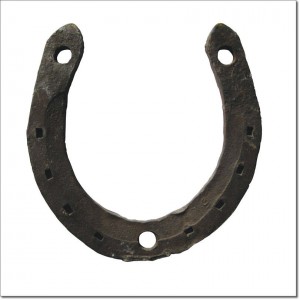
Saving the LUCK
For several years Aaron spent 3 days on a Dude Ranch in Michigan.
Before the Dude Ranch closes for the winter, buses of adults with all kinds of disability labels arrive and sleep in bunk houses, eat in mess halls, go boating, ride horses and sing songs around the campfire. For many of these adults—this is the highlight of the year.
The ranch’s owner is friends with the owner of the residential company which provides Aaron’s supports. (This is a great example of Bronfenbrenner’s system’s theory—circle of friends, using your contacts…click here).
Aaron is assigned a staff counselor one-on-one, but everyone pitches in to make sure everyone is safe and has a good time. Always being safe and having a good time sometimes contradict each other. Bob Perske used to talk about, “The Dignity of Risk” and as parents this is a complex and difficult balancing act.
This year we were lucky because one of Aaron’s regular staff went to camp. This was nice because she has worked with Aaron for 6 months and knows what Aaron likes and doesn’t like. So that helped mom’s anxiety and I would think made a big difference to Aaron.
This is about Aaron’s fifth dude experience and each time it’s a worry for me and Aaron’s dad. It is hard to get good feedback on what Aaron does and doesn’t do. I wish he could talk and tell us but I figure it is a change of pace, he likes to ride on the bus, sing songs. Especially, he likes to go horseback riding.
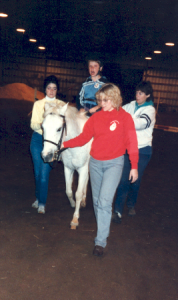
Aaron as a little cowboy
When Aaron was growing up, he took horseback lessons for about 10 years. He only stopped because he reached the 150 pound weight limit. When Aaron sits atop a horse, he looks like Prince Charles: head high, back straight, sometimes he even points his toes. I think he and the horses communicate in their own cosmic language. Sue Radabaugh, Bobbi Theis and the physical therapist at Cincinnati Riding for the Handicapped gave Aaron and each rider a lucky horseshoe at the end of each series of lessons.
We learned horseshoes should always be positioned so the luck stays inside the horseshoe and doesn’t fall out. Aaron still has the horseshoes–God knows we don’t want to have our luck fall out.
Each year, I try and give Aaron “the dignity of risk” and not worry about the million of things that can go wrong at camp. I don’t like to think of myself as one of those “over-protective” or “hovering” parents. Some years have gone better than others, but each year we hope and pray our luck holds.
It is just difficult having a person like Aaron who is so vulnerable, when we don’t really know how the staff will act in this very different environment. For instance, Aaron has red hair, freckles, and burns in about 15 minutes in the sun. His caregiver is from Jamaica and has never had a sunburn in her life. I send sunscreen, I give instructions, but each year we ask, “Will Aaron come home with a sunburn?” In the post about deciding to go to the family reunion (click here) I could actually do the ecological assessment and control the environment. But the Dude Ranch is too far away. I had to put the control in the staff’s hands. And we’ve had some rocky experiences with some staff.
We did find out that Aaron went right up to the horses and wanted to ride, he went out on the lake in a boat four times, and he passed out the light bracelets for the barn dance the last night. The little radio we sent for the bus ride worked well, and actually came back with Aaron. Only one toileting accident. So all is well for another year. Hopefully we will see some pictures. And hopefully we will be even better prepared for next year.
Maybe I should hammer some horseshoes (with the luck inside) up on our front door. Whew! made it another year.
by Mary E. Ulrich | Jul 1, 2024
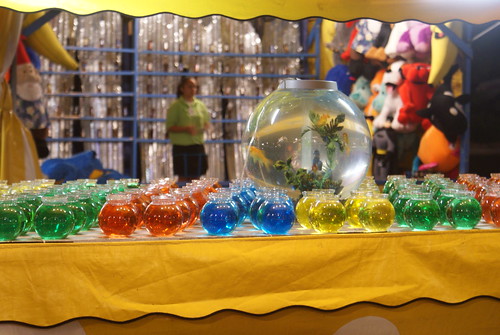
 photo credit: bradleygee
photo credit: bradleygee
On “Happy Feet,” “Retarded Teeth” and “Carnival Goldfish”
From 1986 (Aaron 12 years, Tommy 10 years)
Carnival Goldfish
Last year at our PTA school carnival, my son Tommy, after numerous tries, threw the ping pong ball in the little glass bowl and won a goldfish. He was thrilled. I was busy working at the Magic Show and was hardly enthusiastic about his new transparent fish in the baggie.
Tommy named the fish “Red and Gold” after the red spot on his back. He wanted to immediately buy a 100-gallon tank, fish food, colored rocks, etc…. We compromised on old glass and the promise that “if it lived” we would get the needed supplies. As we went to bed we talked about how our friend Billy’s carnival goldfish didn’t survive the first night. We talked about how it would be sad if his fish died, but we would flush it down the toilet. We talked about a friend’s dog that had died and how there was a life and death cycle and only the strongest would survive.
At 5:00 AM a jubilant Tommy raced in with “Red and Gold” still swimming in the glass. Being tired (it was 5:00 AM) and a realistic mother I said, “That’s good so far, but don’t get your hopes up.” We fed the fish stale bread for a couple of days because I didn’t want to waste $3.00 on fish food. Every day after school, Tommy would race in to check on his “Red.”
Philosophically I had always felt it was more important to put our energy into helping people. I found it difficult to accept that some pets are treated better than people. I had zero expectations this fish could be healthy. Zero expectations its very existence could be meaningful to Tommy. Zero expectations, except that if it did survive it would be just one more responsibility for me. I really just wanted the fish to die, and get it over with.
Happy Feet
This same week, we had an appointment with the orthopedist for my son Aaron. Aaron has the labels of autism and intellectual disability; some doctors have also said Cerebral Palsy and extremely flat feet.
The orthopedist walked into the examination office with several interns on his heels. Without even acknowledging the fact that Tommy, Aaron, my husband, and I were in the room he spoke into a tape recorder while the interns were taking notes. “Here is a white male, appears to be about 10, with a (something or other jargon…surgery on his ….” He continued for another 3-4 minutes, poking Aaron in different parts of his foot, legs and hips to test this or that reflex.…. He never gave eye contact to Aaron or any of us.
Nervously, Aaron began biting his hand.
At this point, my husband walked over to the Doctor, extended his hand, and said, “Hello, I don’t believe we’ve met.” This took the Doctor off guard and he turned off the tape recorder. In the give-and-take of the next few minutes, we explained our concern for Aaron’s gait and balance. We demonstrated the exercises our physical therapist recommended. Did he say Aaron needed surgery? Did Aaron need a new prescription for his shoe inserts?
Instead of answering our questions the Doctor turned and asked me, “Is he happy?”
“Is Aaron happy?” I repeated, not quite sure what the Doctor was asking. I fumbled out an answer of how we try to make Aaron happy. Then the Doctor said, “It would be very difficult to get Aaron to understand surgery, orthopedic appliances, etc., so let’s not upset the apple cart and do anything to his feet that would make him unhappy.”
Retarded Teeth
My friend Susan, also “severely challenged” went to the dentist. At 13 she still had her baby teeth. Her mother was very concerned because her permanent teeth were crowding her mouth but the baby teeth weren’t falling out. The dentist brushed off the concern. “Why bother, she’s retarded, just let her have two rows of teeth. She’s not going to ever be prom queen.”
We actually know a man with Down syndrome whose parents were told their son would die before he was 6 years old. When he was 10 and his baby teeth still didn’t fall out, the dentist told the parents it was not worth putting the boy through the discomfort of getting his teeth pulled because he wouldn’t live very long. Well, the man is not 56. He still has the two layers of teeth. His baby teeth were never pulled. And now, he has impacted teeth which give him much pain and he has to have all his food cut into tiny pieces or pureed.
No Expectations
I wish these were isolated stories.
When I worked at the Parent Center, every day we would hear of people with disabilities being denied communication devices, tubes in their ears, surgery for tight leg muscles…because there were no expectations, no intrinsic worth or value to their lives.
“Red” is fine, but my face is red.
At Tommy’s persistence, we eventually bought a real fish bowl and real fish food. Even though “Red” is totally dependent on Tommy, I’ve watched Tommy feed him and change his water, proudly introduce “Red” to his friends, and alternate dropping his GI Joe men into the fish bowl to give Red some variety in his life.
An animal that can’t walk, talk, jump or play–“Red” had given much to Tommy. In spite of my initial prejudice and negative attitude, “Red” has become a valued part of our family.
It embarrasses me to think I made “Red” prove his worth before I would meet his basic needs of more space and real food. Nothing was wrong with the fish. I was the one with the problem.
Happy Ending
This year’s Carnival was yesterday. Tommy sang Happy Birthday to “Red,” and guess what? Tommy spent his first ticket winning a playmate for “Red.”
Comments:
Does anyone else want to share an embarrassing story about low expectations, and surprises? Have any of you had similar experiences with anyone in the medical professions? Schools? Community?
Keep Climbing: Onward and Upward
All the Best,
Mary
by Mary E. Ulrich | Jun 25, 2024
Tale of Two Brothers: Sibs of People with Disabilities
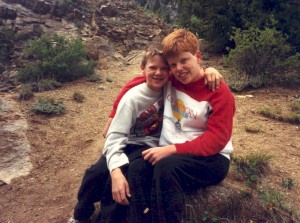
Tommy and Aaron hiking in Smokies
It was the best of times and the worst of times. (Sorry, couldn’t resist.)
All boys and girls grow up into adults. If the statistics are correct that one in 86 children now have the label of autism–that’s a lot of brothers and sisters.
The cute little brothers on the hiking trail grow into … what?
Can the brothers and sisters of people with disabilities, including autism, stay close and involved in their sibling’s life? How does it change over time? Can anyone have a “normal” life?
When we first suspected something was wrong with Aaron we went to the neurologist and began tests. We told him we were considering having a second child and he said, “Great, Aaron would love to have a brother or sister.” The tests took 6 months and fortunately for us, we were already pregnant when the neurologist told us Aaron would, “always be in special schools.” (which was his way of saying Aaron had cerebral palsy and was “severely retarded”–though at the time we didn’t know what he meant.) Tommy is 18 months younger than Aaron who later added autism to his list of neurological labels.
I can’t imagine our lives without Tommy. I think God knew our family needed him to help us get through the rough spots. He is a very thoughtful quiet guy, who is one of the most caring people on the planet. He is also a terrific problem solver and continues to be such a source of joy and support to Aaron and all of us.
Aaron is now 49 and Tommy is now 47, but in this picture (Aaron 10 yrs) and Tommy (8 yrs) pose on one of the hiking trails in the Great Smoky Mountains. Sometimes our whole family would go on the hikes, sometimes Tommy and his dad, Tom, would hike and spend a couple of nights on the trail while Aaron and I stayed in the base camp.
Thankfully Aaron let me use him for an excuse so I wouldn’t have to hike 10 miles up the mountain, sleep on the ground worrying about bears, and shovel the … you know. Sometimes it was just Aaron and me roughing it in the popup camper. Sometimes my dad or sister Janet joined us at basecamp. It was always a great family adventure (click here).
Tommy has always been involved in Aaron’s life. Until he went to college, they went to school together and participated in some extracurricular activities together. He certainly had his own friends and activities, but Aaron was involved in his life whether it was cheering at his baseball games, watching him play video games, or building stereo speakers….
In the last several years Tommy’s job, as a radio frequency engineer, has taken him to South Carolina, North Carolina, Pennsylvania, Virginia, and D.C. (Did I mention he was in charge of setting up the cell phone operations for NASCAR and the Super Bowl?) 🙂
He recently moved his family back to Cincinnati and is now living between Aaron’s house and our house so we get to see his family almost every week.
Because Tommy has grown up with Aaron, he knows what Aaron likes and dislikes–sometimes even better than Mom.
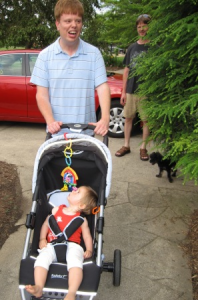
Aaron pushing Isabella in the stroller
Tommy invited us all to his house yesterday and his wife Ana fixed an amazing dinner. Isabella (1 year old) was climbing on Aaron and making him laugh.
Dignity of Risk
Tommy is now an adult who understands the “dignity of risk” (click here) and lets Aaron share his life with his family. Notice that while Aaron is pushing Isabella in the stroller, Tommy is hiding in the bushes making sure everything is okay.
Aaron can independently push Isabella and talk to her (why she was looking at him). He is using his skills. But Tommy is close by. Isabella enjoys her ride with Uncle Aaron and is safe.
I could not have planned for this special moment. I did not have a lesson plan or task analysis. Tommy just figured it out.
What a great brother.
LIFE IS GOOD!
Another Quote:
I remember reading an article where one brother of a person with a severe disability said, “Growing up was like being an only child, with a brother.” When I asked Tommy about this, he was very thoughtful and just nodded.






